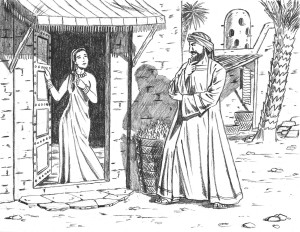
THE FUNDAMENTAL PROBLEM OF ISLAM is the belief that God talked to Muhammad and dictated the contents of the Koran to him. Muslims are indoctrinated into believing this is so, and they act on the numerous incitements to violence that they find in it.
For insight into Muhammad’s mental condition, consider Chapter 33 of his Koran, entitled “The Confederates.” This is one of the chapters Muhammad composed in Yathrib (later called Medina) where he fled after his Meccan compatriots determined they needed to kill him to preserve their way of life.
The chapter is like a wild theme park ride that races in and out of numerous topics. In the 73 verses that make up the chapter, Muhammad covers the following in the God-voice he used for the Koran: He recaps a recent battle with the Meccans and excoriates people who were afraid to fight and die for him; he gloats about his extermination of the men and boys of one of the Jewish tribes of Yathrib, the confiscation of their property, and the enslavement of their women and children; he authorizes himself to take as many wives as he likes, permits himself to marry the wife of his adopted son, forbids himself from taking any more wives after he has taken as many as he likes, but allows himself sex slaves.
As the verses of this “revelation” continue, Muhammad imposes full body and face cover for women when outside the home, threatens people with humiliating punishment in the afterlife for annoying him, threatens to murder his critics, prohibits the practice of adoption, and dishes up images of sadistic torture in Hell awaiting people who don’t believe in him. He also praises himself as a “lamp spreading light,” and holds his behavior as a “beautiful pattern” for people to follow if they want to score well with Allah.
Among the verses is a celestial advisory that he must be obeyed:
“It is not fitting for a Believer, man or woman, when a matter has been decided by Allah and His Messenger to have any option about their decision: if any one disobeys Allah and His Messenger, he is indeed on a clearly wrong Path.” (Koran 33:36) [All of the Koran quotes in this article are taken from the Yusuf Ali translation.]
Despite their tediousness, it is worth exploring some of these verses because, in addition to providing evidence of his strange mentality, they also show that his Koran was like a blog in which he commented on the happenings of the moment. The happenings of the moment recorded in Chapter 33 had to do with war, sex, and Muhammad’s betrayal of his adopted son.
In the war part of these verses, Muhammad covers the Meccan assault on Yathrib that came to be known as the Battle of the Trench, so named because of a three-mile defensive trench he dug around vulnerable parts of the valley to fend off the attackers. By the time of this battle, he had been waging war on the Meccans for almost five years. The two major battles of Badr and Uhud had already been fought.[1]
The Battle of the Trench was the third major fight, which took place in A.D. 627. The Meccans attacked with an army of 12,000 warriors, drawn from numerous tribes who were itching for payback for all the harm Muhammad had caused them. But they were unable to get beyond the trench and finally gave up after a fierce windstorm leveled their encampments.
Verses 9 to 25 recap the action. Most are a diatribe against cowardly or fake believers who Muhammad was certain would have betrayed him had they been given the opportunity. But he declares that Allah did not provide them with the opportunity because he sent the windstorm that disheartened the invaders and sent them packing. The battle was a test of faith of the believers who held firm, and Allah knows how to reward those who hold firm in their faith.
And rewarded they were: After the invaders left, Muhammad attacked the only remaining Jewish tribe of Yathrib and ended up distributing their wealth to the faithful. When he arrived in the valley, half of its 20,000 population was Jewish, divided among three major tribes. By the time of the Battle of the Trench, Muhammad had driven out two of the Jewish tribes. Hoping to escape the same fate, the remaining tribe at first insisted on not taking sides during the Meccan attack, then agreed to aid the invaders, but then backed out of it. Muhammad used this as an excuse to behead all of the men and boys.
About this massacre, Muhammad has Allah say:
“And those of the People of the Book (the Jews) who aided them (the invaders) – Allah did take them down from their strongholds and cast terror into their hearts. (So that) some ye slew, and some ye made prisoners. And He made you heirs of their lands, their houses, and their goods, and of a land which ye had not frequented (before). And Allah has power over all things.” (Verses 26-27)

The fundamental problem with Islam is the belief that God talked to Muhammad and dictated the contents of the Koran to him. Muslims are indoctrinated into believing this is so, and they act on the numerous incitements to violence that they find in it.

MUHAMMAD ENAMORED. Like David when he saw Bathsheba bathing, Muhammad lusted after the wife of his adopted son Zayd one day when he visited their home and she answered the door in a skimpy dress. He got his adopted son to divorce her and he married her, adding her to his growing harem. He also ended the practice of adoption so that Zayd was no longer recognized as his son. (Illustration fromIt’s All About Muhammad, A Biography of the World’s Most Notorious Prophet, p. 272)
This amazing chapter continues with details about the wedding banquet with Zaynab. It so happened that his anger was sparked when some of the male wedding guests dallied after the banquet was over. This irked Muhammad to no end, perhaps in part because he was eager to sleep with Zaynab, and they kept him from her, but also because he suspected the men had lingered in order to ogle his bride. He composed Verses 28-34 that warn all of his wives to watch their behavior. Then in verse 59, he decides good behavior is not enough. His wives and all believing women from then on had to cover up so that no part of their body was on display outside of the home. Thus the burka was born:
“O Prophet! Tell thy wives and daughters, and the believing women, that they should cast their outer garments over their persons (when abroad): that is most convenient, that they should be known (as such) and not molested. And Allah is Oft-Forgiving, Most Merciful.” (Verse 59)
Read complete article HERE!